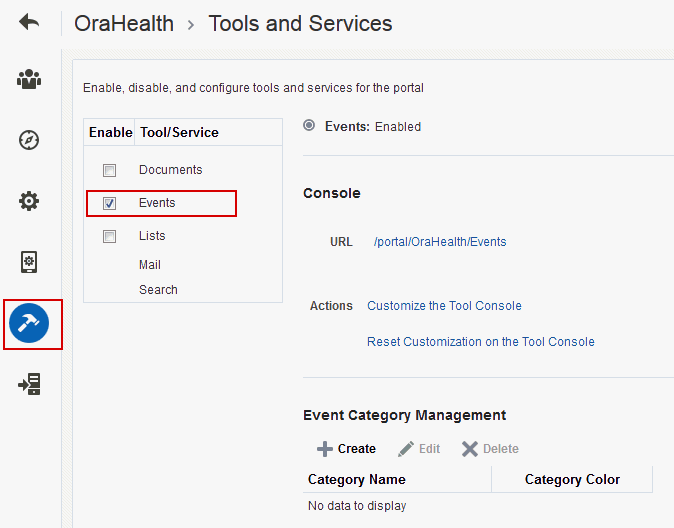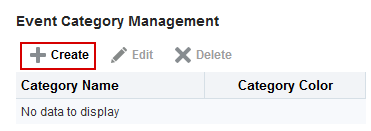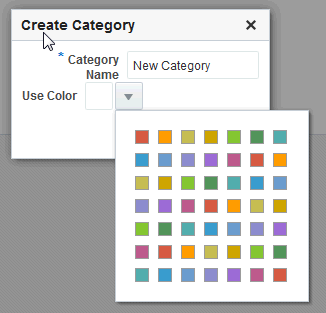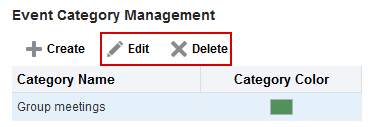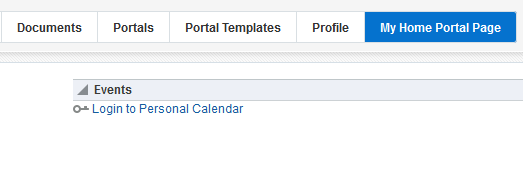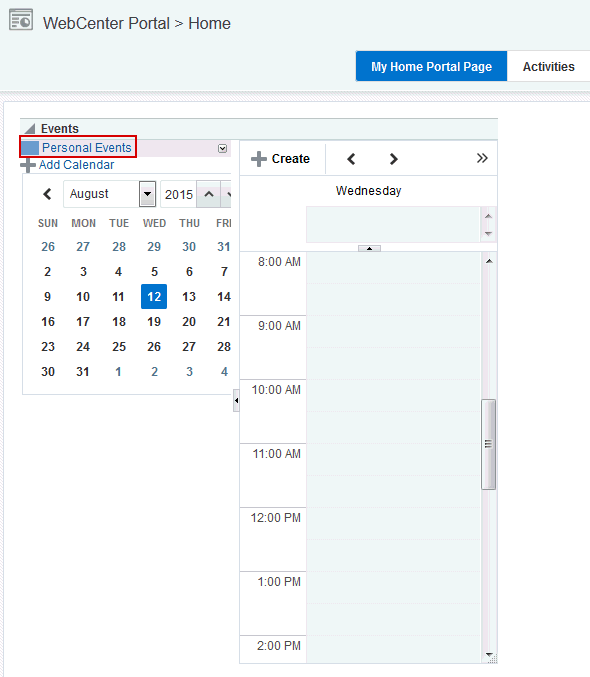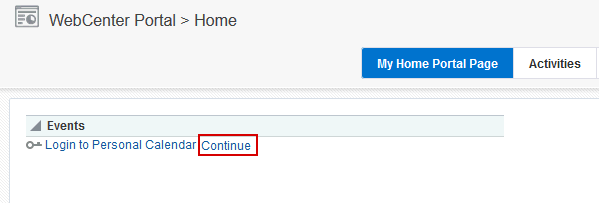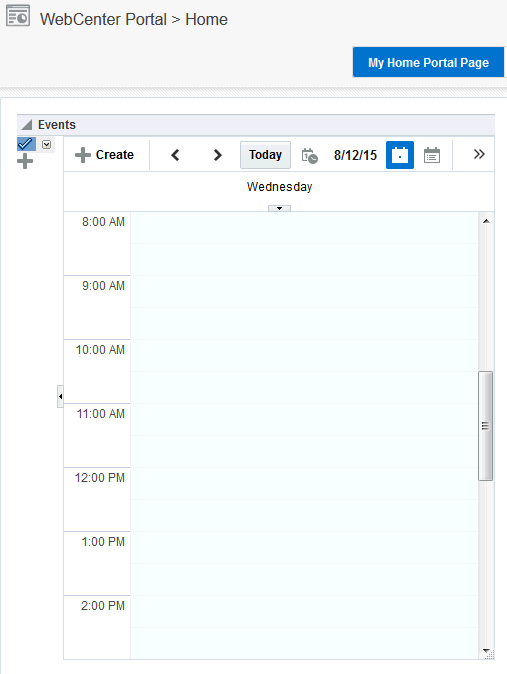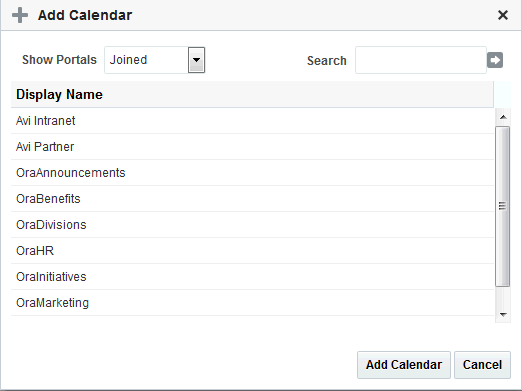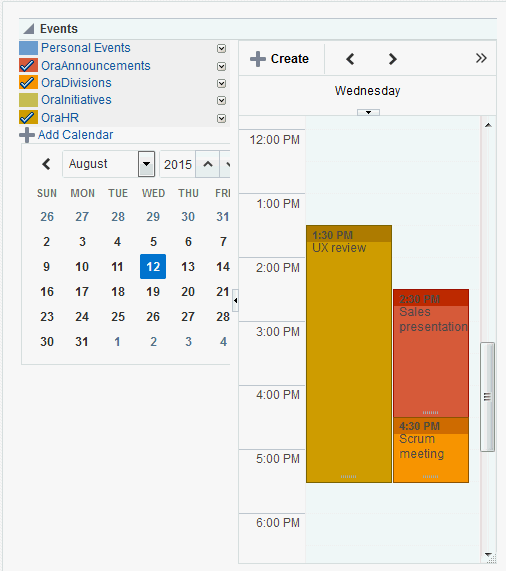46 Adding Events to a Portal
Permissions:
To perform the tasks in this chapter, you must be a portal manager or a portal member with the portal-level permissions Manage Security and Configuration or Manage Configuration.
At a minimum, you must have the following permissions:
-
Edit Pages(to add the Events task flows to a page) -
Edit Task Flows(to enable calendar overlays)
Topics:
Prerequisites for Events
For events to work, the system administrator needs to perform the following task for WebCenter Portal:
-
For using personal calendars, install the Microsoft Exchange server components and configure the application for WebCenter Portal. The connection between the two applications must be active. For more information, see Managing Calendar Events in Administering Oracle WebCenter Portal.
See Also:
Troubleshooting Issues with Events in Administering Oracle WebCenter Portal
To make events available in a portal, the portal manager or anyone with Manage Security and Configuration or Manage Configuration permission must perform the following tasks:
-
For portal events, if not already enabled during portal creation, enable the Events tool, as described in Enabling and Disabling Tools and Services Available to a Portal.
-
Optionally, configure the event categories, as described in Creating and Managing Portal Event Categories.
-
Provide access for users to events in any of the following ways:
-
Provide users with the pretty URL to the Events page (see Pretty URLs for Pages in a Specified Portal).
-
Add a page link to the Events page in the portal navigation (see Adding an Events Page to a Portal).
-
Add the Events task flow to a page in the portal (see Adding an Events Task Flow to a Page).
-
Note:
For information about the events feature and how to use calendaring and events, including subscribing to events, see Working with Calendars and Events in Using Portals in Oracle WebCenter Portal.
About Calendars and Events
Events include appointments, meetings, presentations, and so on. WebCenter Portal provides two kinds of events:
Note:
For events to display, events must be enabled and the Events task flow must be added to a page or the Events page (or console) must be accessible. See the following sections:
-
Personal events are not related to a specific portal. They could include personal appointments with a doctor or dentist, or lunch with a friend.
Personal events come from your Microsoft Exchange calendar and display only to you in Events task flows that are located on pages in the Home Portal. See Showing Events on a Page in the Home Portal.
-
Portal events are related to a specific portal. They could include weekly meetings, presentations, or a customer visit.
Portal events display to all members of the portal on the portal's dedicated Events page (which can be exposed by the portal manager) or in any Events task flow that is located on a page in the portal.
See Also:
Where to View Events in Using Portals in Oracle WebCenter Portal
There are two task flows for displaying both personal and portal events:
-
The Events task flow provides a fully featured calendar where, as well as viewing events in a variety of layouts, you can also create and manage events and display events from multiple calendars.
-
The Events - Mini View task flow provides a more compact view of events as a list. You can view upcoming events and edit existing events. You cannot create new events in this task flow. This is useful if you want to provide information about events but do not have enough space on the page for a full calendar.
-
Creating and Managing Portal Event Categories
Note:
Enable Events, as described in Enabling and Disabling Tools and Services Available to a Portal.
Portal event categories let users group certain events together (for example, team meetings, personal appointments, customer meetings, and so on).
Categories can have any name and an optional color associated with it. If a color is selected, events belonging to the category are displayed in that color on the Events page or in an Events task flow.
To create and manage event categories in a portal:
Showing Events on a Page in the Home Portal
You can maintain a calendar of personal events external to WebCenter Portal that does not relate to specific portals. If you use Microsoft Exchange 2007 (or later) for this calendar, you can include your personal events on a page in the Home portal. This keeps all your calendar information in a single place, here you can view, edit or delete personal events or create new personal events that are pushed to your Exchange calendar.
Note:
You can use calendar overlaying to display portal events alongside personal events on a page in the Home portal, but you cannot push portal events into your Exchange calendar.
For more information about calendar overlaying, see Displaying Multiple Calendars in an Events Task Flow.
To show events on a page in the Home portal:
Note:
Before you can access your personal events in WebCenter Portal, your system administrator must install and create an active connection to the Microsoft Exchange Server. See Managing Calendar Events in Administering Oracle WebCenter Portal.
Showing Events on the Events Page in a Portal
Showing Events on a Page in the Home Portal describes how you can add the Events task flow to a page in the Home portal to display your personal Exchange calendar. This section describes viewing events on the Events page or console. In every portal where events is enabled, portal events display on the Events page. However, the Events page (or console) will not display by default. You will need to provide navigation by giving users access to the page through a pretty URL or by adding an Events page to the portal. See Adding an Events Page to a Portal.
Note:
The Home portal does not show the Events page by default, but users can expose it in their view using the Show Page option on the Personalize Pages page. See Showing or Hiding Pages in Your View of the Home Portal in Using Portals in Oracle WebCenter Portal.
Figure 46-9 shows the Events task flow on the Events page (or console).
Figure 46-9 Events Task Flow on the Events Page
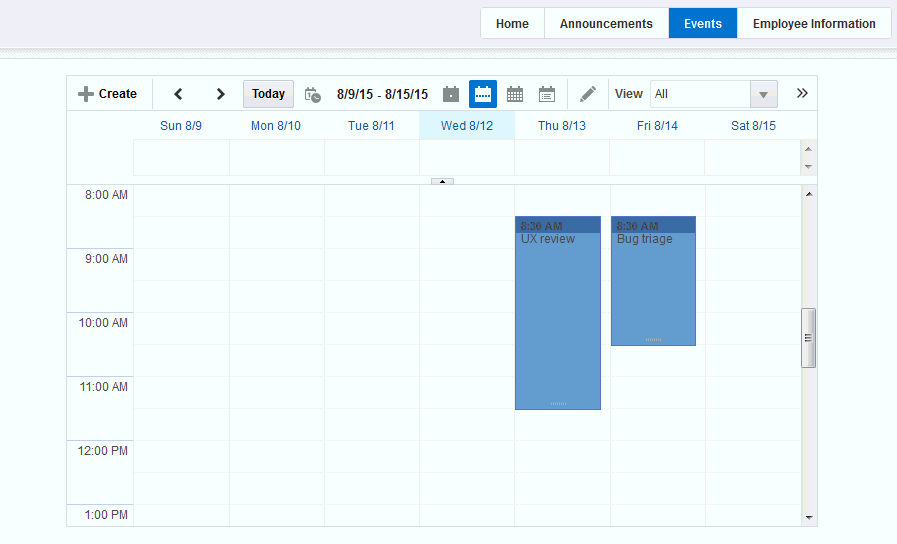
Description of "Figure 46-9 Events Task Flow on the Events Page"
You can also add the Events task flow to another page in your portal, as described in Adding an Events Task Flow to a Page.
Displaying Multiple Calendars in an Events Task Flow
In addition to displaying your personal events in the Home portal, you can also display events from multiple portals in an Events task flow. This is referred to as calendar overlaying. In this way, you can have all your important events available in one location, the Home portal, rather than having to go to multiple portals to manage your daily schedule.
The events from each calendar are displayed in a different color to help identify the source of the event, if you created categories at the time you enabled events (see Creating and Managing Portal Event Categories). If you are overlaying calendars on a page in the Home portal or on a portal page, category colors are used only for events from the current portal. All events from overlaid calendars are displayed in the color defined for that portal if the events do not have categories. But if the overlaid calendars have event categories, then the events with category will be shown for the calendars from other portals, provided the portal in which overlay is enabled has that same category.
Note:
Calendar overlaying is available only in Events task flows. A portal's Events page or console displays events from the current portal only. For the Events task flow to display, the Events task flow must be added to a page in the Home portal. See Adding an Events Task Flow to a Page.
This section includes the following subsections:
Displaying Additional Calendars
When the calendar overlaying feature is enabled (see Enabling Calendar Overlaying), users can display as many calendars as they want in the Events task flow. Each calendar's events are displayed in a different color to make it easier to distinguish which calendar it belongs to.
To display additional calendars:
Adding an Events Page to a Portal
To provide navigation to the Events page in a portal, you can add a page link to the portal navigation, as described in Adding an Existing Page to the Portal Navigation.
Note:
The Events page (or console) is not automatically exposed when the tool is enabled or when the portal is created. However, if the portal template exposes the Events page, the portal that is created from the template will also automatically expose this page.
Adding an Events Task Flow to a Page
For the steps to add an events task flow to a page, see Adding a Component to a Page.
Tip:
The presence or location of the Events task flows in the resource catalog depends on how the resource catalog is configured. For example, in the default resource catalog, the Tags task flows are included under the Social and Communication folder.
For more information about the Events task flows, see About Calendars and Events.
Figure 46-16 shows the Events task flow on a page in the Home portal.
Figure 46-16 Events Task Flow with Full Calendar Overlay Area
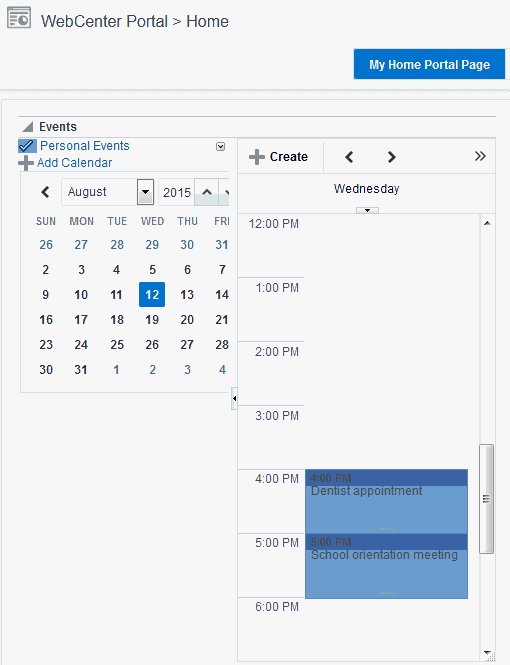
Description of "Figure 46-16 Events Task Flow with Full Calendar Overlay Area"
Users with Edit privileges can access the task flow's Component Properties dialog in the page editor (see Working with Events Task Flow Properties).
Working with Events Task Flow Properties
The Events task flows have associated properties, which users with sufficient privileges can access through the task flow's View Actions menu. For example, select Parameters to display the Parameters dialog (Figure 46-17).
Figure 46-17 Events Task Flow Component Properties
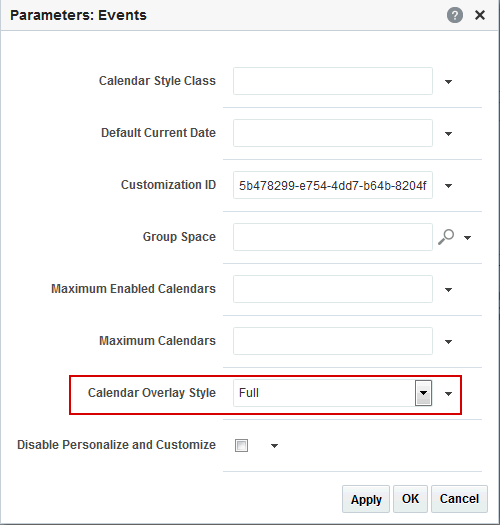
Description of "Figure 46-17 Events Task Flow Component Properties"
See Also:
The following sections provide information about properties of the Events task flows and describe the task flow parameter:
Setting Events Task Flow Properties
In the page editor, selecting any component exposes a View Actions menu (Figure 46-18), which provides access to the component’s properties: Parameters, Access, Display Options, Style, and Content Style.
Figure 46-18 View Actions Menu on an Events Task Flow
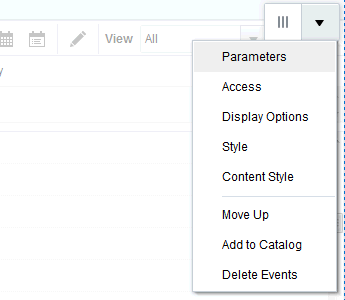
To set Events task flow properties:
Events Task Flow Parameters
Table 46-1 describes the parameters that are unique to the Events task flow.
Table 46-1 Events Task Flow Parameters
| Parameter | Description |
|---|---|
|
|
Whether calendar overlay is enabled. Valid values are:
|
|
|
The name of the custom style class you want to apply to the calendar component. |
|
|
A unique identifier for event view customization. Customization ID assists with maintaining the association of this task flow instance with its customization and personalization settings. This value is set automatically. Do not edit this value. |
|
|
The default current date on the calendar. Valid values are:
|
|
|
A check box to determine whether users can personalize or customize the task flow. If not selected, users can personalize and customize the task flow. |
|
|
The name of the portal that is the source of listed events. Valid values are:
The portal display name is available on the General page in the portal administration settings. |
|
|
The maximum number of calendars that a user can add to the task flow. When the maximum is reached, the Add Calendar icon no longer appears in the task flow. Default value: |
|
|
The maximum number of calendars that a user can display simultaneously. This value must not be greater than the value specified for Maximum Calendars. Default value: The same value as that specified for Maximum Calendars |
Events - Mini View Task Flow Parameters
Table 46-2 describes the parameters that are unique to the Events - Mini View task flow.
Table 46-2 Events - Mini View Task Flow Parameters
| Property | Description |
|---|---|
|
|
Custom calendar toolbox layout. The value is passed to the ADF calendar component as a |
|
|
A unique identifier for event view customization. Customization ID assists with maintaining the association of this task flow instance with its customization and personalization settings. This value is set automatically. Do not edit this value. |
|
|
The maximum number of characters of the event title to display in Mini view. Leave blank or enter Default value: |
|
|
The number of days for which to list upcoming events. Default value: |
|
|
The number of events to display at one time. Default value: |
|
|
A check box to select determine whether to use the ADF Calendar UI Component or a simple list with page flow. |
